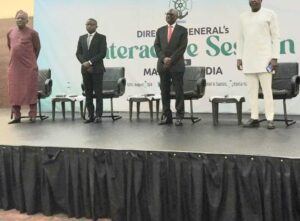The Nigerian Maritime Administration and Safety Agency (NIMASA) has reaffirmed its commitment to addressing long-standing issues related to the entitlements, pensions, and gratuities of retired maritime workers. During his inaugural press briefing with maritime journalists, Dr. Dayo Mobereola, the Director-General of NIMASA, emphasized the agency’s dedication to resolving these concerns, which have affected numerous former employees over the years.
Dr. Mobereola acknowledged the unfortunate situation where many former NIMASA workers, who devoted significant portions of their lives to public service, have yet to receive their due entitlements. He stated, “We are actively collating data to expedite the payment process for the surviving retirees, though it is regrettable that some have passed away without receiving their benefits.”
In addition to addressing retirees’ concerns, Dr. Mobereola tackled various challenges facing Nigeria’s maritime sector. He clarified that Nigeria will not establish a National Carrier but will instead support citizens in owning vessels, thereby strengthening the domestic shipping industry.
He also provided updates on the Cabotage Vessels Financing Fund (CVFF), noting that the fund, which is intended to support Nigerian ship owners, remains secure with the Federal Government. “The CVFF is not just revenue; it’s a critical investment in the development of Nigeria’s shipping sector,” he explained, adding that the agency is working on improving the processes and guidelines to maximize the fund’s impact.
One of the pressing issues Dr. Mobereola highlighted is the burden of War Risk Insurance Premiums (WRIP) on Nigerian-bound vessels. Despite a notable decline in piracy and sea robbery incidents in Nigerian waters and the Gulf of Guinea, international insurers continue to charge exorbitant premiums. Dr. Mobereola described this as a “cartel-like” practice that NIMASA is determined to challenge. He mentioned efforts to engage international maritime organizations, including the United Nations, to reduce these unjust premiums.

Read also: Enugu State govt unveils plan for a green, sustainable future
Under Dr. Mobereola’s leadership, NIMASA is set to undergo significant automation reforms aimed at streamlining the agency’s processes. He noted that the agency is exploring best practices from countries like the United Kingdom to implement seamless automation in ship registration and other critical functions. “Automation of our processes will lead to greater efficiency and transparency,” he assured.
Addressing the Modular Floating Dock’s future, Dr. Mobereola disclosed that NIMASA is committed to making the dock operational in a way that maximizes its benefits for the economy, seafarers, and the agency itself. He dismissed calls to relocate the dock to the Nigerian Maritime University (NMU) in Delta State, stressing that the initial deployment plan was flawed. “We will place the dock in an appropriate location to ensure it serves its intended purpose,” he stated.
Regarding the National Seafarers Development Program (NSDP), Dr. Mobereola reaffirmed NIMASA’s commitment to enhancing the quality of training for Nigerian cadets. He clarified that the agency is not planning to recall cadets from foreign training institutions but will ensure these institutions adhere strictly to agreed standards to produce competent and employable seafarers.
Dr. Mobereola concluded by emphasizing NIMASA’s role in supporting President Bola Ahmed Tinubu‘s agenda to diversify Nigeria’s economy. He highlighted the Marine and Blue Economy as crucial sectors for achieving this goal, aiming to shift Nigeria away from its dependence on crude oil. “The Marine and Blue Economy offers the best opportunity for Nigeria to diversify its economy sustainably,” he asserted.
NIMASA’s renewed focus on resolving retirees’ issues, combating unfair industry practices, and modernizing its operations reflects the agency’s broader commitment to driving growth in Nigeria’s maritime sector and contributing to the nation’s economic diversification efforts.






